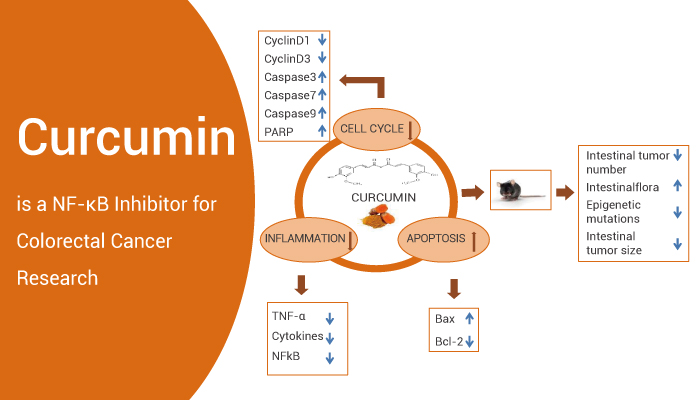Curcumin (Diferuloylmethane), a natural phenolic compound, is a specific inhibitor of acetyltransferase p300/CREB binding protein and NF-κB. It also inhibits the acetylation of histone/non-histone proteins and histone acetyltransferase-dependent chromatin transcription. Curcumin exert multiple anti-colorectal cancer activities in a coordinated manner through key cancer-related signaling pathways. Moreover, it has various pharmacological effects such as anti-inflammatory, antioxidant, anti-proliferative and anti-angiogenic effects.
Curcumin is a NF-κB inhibitor with antioxidant, anti-inflammatory, antibacterial, and antiviral activities.

Curcumin induces the stabilization of Nrf2 protein through Keap1 cysteine modification and also has inhibitory effects on NF-κB and MAPKs. Therefore, it exhibits the ability to influence breast cancer cell proliferation and invasion by downregulating NF-κB-induced genes. It downregulates Akt protein and induces inhibition of autophagy and ubiquitin-proteasome pathways. It is possible that Curcumin’s ability to induce apoptosis and autophagy is achieved by blocking the PI3K/Akt signaling pathway.
Curcumin shows promise in inhibiting cancer diseases, but its further development is limited by low bioavailability and low water solubility. It has been reported that after oral administration, Curcumin is rapidly converted into metabolites, resulting in low levels of free Curcumin in plasma. So many studies have been devoted to developing innovative delivery systems to improve the pharmacokinetics of Curcumin. For example, Curcumin encapsulated in protein nanoparticles (NPs) showed better anticancer activity. Experimental verification found that Curcumin-NPs could effectively cause MCF-7 cells to lose viability and have enhanced oral bioavailability in rats. Or the nanoformulation ExoCUR, a mixture of Curcumin and milk exosomes, is orally effective in Sprague-Dawley rats. ExoCUR also had in vivo effects in nude mice bearing cervical CaSki tumor xenografts.
In summary, Curcumin has excellent anti-cancer potential and is involved in the cell signaling pathways of cancer occurrence and proliferation. Including regulatory growth factors, enzymes, transcription factors, kinases, inflammatory cytokines, and pro-apoptotic (by up-regulation) and anti-apoptotic (by down-regulation) proteins. Curcumin not only has medicinal effects alone, but can also be used in combination with other drugs to become a targeted cancer inhibitor.
References:
[1] Giordano A, et al. Curcumin and Cancer. Nutrients. 2019 Oct 5;11(10):2376.
[2] Weng W, et al. Semin Cancer Biol. 2022 May;80:73-86.